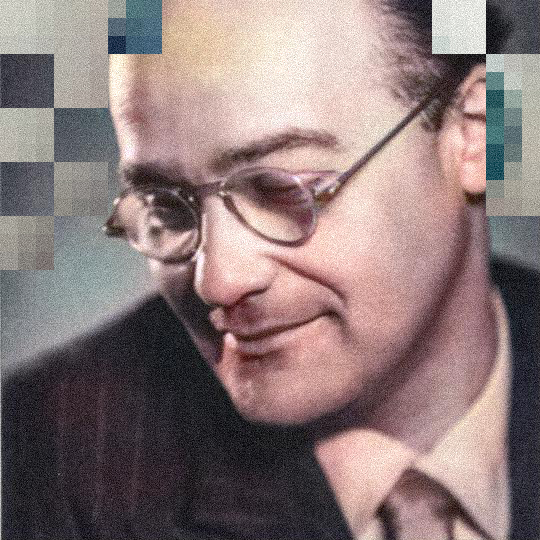Roman Brandstaetter
Roman Brandstaetter (1906–1987) was a poet, author and translator. In his life and work, he brought together Jewish and Christian traditions. From the 1930s onwards he took part in the debate over the identity of Polish Jews and in wider discussions about the sources of European culture. He translated five Shakespeare plays: Hamlet (1952), Król Ryszard III (Richard III, 1953); Kupiec wenecki (The Merchant of Venice, 1953); Antoniusz i Kleopatra (Antony and Cleopatra, 1958) and Król Henryk IV, Część 1 (Henry IV, Part 1, 1962). His translation and analysis of Hamlet created a new post-war paradigm for the interpretation of Shakespeare.
Brandstaetter graduated from the Jagiellonian University in literature and philosophy. In 1931 he completed a doctorate about Adam Mickiewicz. He wrote the plays Powrót syna marnotrawnego (The Return of the Prodigal Son, 1948), Król i actor (The King and the Actor, 1952), Milczenie (Silence, 1956) and Dzień gniewu (Day of Wrath, 1962). He published a series of four novels under the title Jezus z Nazarethu (Jesus of Nazareth, 1967-1973). In 1973 he was awarded the Polish PEN Club prize for his translations. In 1978 he received the Ministry of Culture and Art prize.
Brandstaetter only translated the Bible and Shakespeare. Translation was a sideline for him. He translated excerpts that fascinated him and that formed the basis for reflection. In the instance of Shakespeare, it was also a source of income at a time when he was under great ideological pressure. He worked under contract for the State Publishing Institute (PIW).
His modus operandi was distinguished by the fact that, in tandem with his translations, he would write reflections and explore associations that over time became the basis of literary-critical essays. He was writing his own plays at the same time. He strove for concision and for psychologically coherent characters. He was never prudish. His translations are shaped by a contemporary sensibility and deploy a modern vocabulary.
The typescript of Brandstaetter’s translation of Hamlet circulated among directors and writers for a long time before it was published. It occasioned numerous reviews that took up sharply-opposed positions with respect to all elements of the text. Later opinions of the translation were influenced by its performance in 1956 at the Teatr Stary (Old Theatre) in Kraków. This production took centre stage in Jan Kott’s essays and his political reading of Shakespeare as our contemporary.
Brandstaetter’s other translations were not reviewed. They were typically performed several times. His translations and his own writings have been the subject of many literary-critical analyses, some of which explore the connections between his own creative output and his work in translation.

Bibliography of translations
William Shakespeare, Hamlet, tłum. Roman Brandstaetter, Państwowy Instytut Wydawniczy, Warszawa 1952.
William Shakespeare, Król Ryszard III. Tragedia w pięciu aktach, tłum. Roman Brandstaetter, Państwowy Instytut Wydawniczy, Warszawa 1953.
William Shakespeare, Kupiec wenecki, tłum. Roman Brandstaetter, Państwowy Instytut Wydawniczy, Warszawa 1953.
William Shakespeare, Antoniusz i Kleopatra, tłum. Roman Brandstaetter, Państwowy Instytut Wydawniczy, Warszawa 1958.
William Shakespeare, Król Henryk IV. Część 1, tłum. Roman Brandstaetter, Państwowy Instytut Wydawniczy, Warszawa 1962.
William Shakespeare, Król Ryszard III. Tragedia w pięciu aktach, tłum. Roman Brandstaetter [w:] William Shakespeare, Dwanaście dramatów, t. 1, oprac. Anna Staniewska, Świat Książki, Warszawa 1999.
Citing
Anna Cetera-Włodarczyk, Roman Brandstaetter EN [w:] Polski Szekspir. Repozytorium polskich przekładów Szekspira w XX i XXI wieku: zasoby, strategie, recepcja [online], Uniwersytet Warszawski, https://xx.polskiszekspir.uw.edu.pl/brandstaetter-roman-translator, 2026-02-15.

